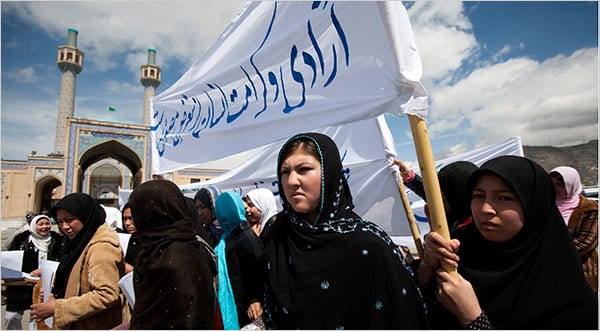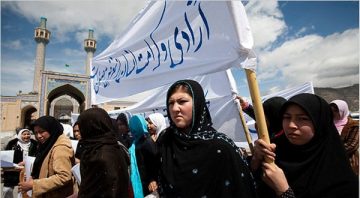by mraynes
I have a feature on my personal blog, First Fig, that I call the “Weekly Anti-Woman Wacko.” I started it because I can’t tell you the number of times I have been told that the feminist movement is no longer relevant because women can now open bank accounts, work outside the home, get abortions and supposedly receive equal protection under the law. While there have been many advances in recent history, misogyny is still alive and well, making feminist ideals desperately needed. So every week on my blog, I highlight an example from the news that proves the relevance of feminism.
EmilyCC and Jessawhy have been encouraging me for a while to put up some of my weekly wackos here at Exponent. I have resisted mostly because I see this as one of the lighter features of my blog and my tone is often mocking in nature. But this week I have not felt so light and I picked a story that I think bears re-posting over here.

I sometimes feel that I am not grateful enough for the gender equality that I enjoy in my country and in my religion. I am reminded of how truly blessed I am when leaders of other countries pass laws like the one Hamid Karzai just passed in Afghanistan. One provision makes it illegal for a woman to reject her husbands sexual advances, effectively legalizing marital rape. (Although, I have seen one compromise where Karzai suggested that the law should be changed to require women to have sex with their husbands every four days…I’m looking for a way to be sarcastic about this but words fail me.) Another provision would not allow girls or women to attend school or work or even leave the house without their father or husband’s permission. Women also could not refuse to wear makeup or dress-up if their husband required it.

Yesterday, 300 very brave Afghan women marched in the street to protest this law and demanded that they be given equal rights…that they be treated like human beings! For this action they were called whores and had stones thrown at them.
I am weeping as I write this because it should not hurt to be a woman and I want to know why it does? This law doesn’t really change anything for Afghan women; they were being beaten and opressed before this law was written and it will continue after the law is passed. But can somebody please explain to me why my Afghan sisters have to ask permission from their government not to be raped?
And in case you’re feeling a little too comfortable in the privilege of being a woman living in the United States, spousal rape was only made a punishable crime country-wide in 1993 when the sexual offense codes were made stricter. Despite the criminalization of marital rape, there are still at least thirty-three states that grant exemptions to the perpetrators in certain cases. There is also one major university granting an honorary doctorate to a famous marital rape apologist THIS YEAR!
We cannot afford to believe that we have reached the pinnacle of equality. And here is pure, unadulterated truth: We are all connected and we are our sisters’ keepers. If there are women being raped and beaten, silenced and forgotten, that matters to me! And it should matter to all of us! As long as misogyny runs rampant through this world, none of us, male or female, will be free.






10 Responses
This is truly appalling, mraynes. Thank you for bringing it up.
mraynes, AMEN!
gotta keep pushing through, ladies.
i really love this post.
Although most of the people who read this blog are women, men also have a responsibility (and those with the priesthood in the LDS church have a priesthood responsibility) to stand and act against such appallingly misogynist laws and cultural attitudes.
take you back in time:
http://www.youtube.com/watch?v=3dPF0SGh_PQ&feature=related
Along with their own activism, Mormon women have the duties of informing their priesthood-holding male counterparts about the issues (as well as their own concerns) and of preparing them to make a difference when the opportunity arises. Men are not going to come to these conclusions by themselves!
Thanks for how you enlighten me, darling!
I heard about this law on NPR. Absolutely awful. And disturbing that marital rape only became a punishable crime so recently in the U.S.
I love this feature, mraynes. I hope you continue with it!
Stories like this always remind me of how women have suffered so much through the history of the world. More so than men, I think. It’s so unfair, and I wonder how God can let it go on. How can some men persecute women when a woman gave them life? I can’t dwell on these questions too much because I get really bogged down with the theodicy question and it starts to erode my faith.
What a sad day for our Afganini sisters. I am humbled by their courage to find a voice and speak out against these policies. I hope we see more of this feature. By they way which university and the person getting the honorary doctorate?
Yes, we are our sisters’ keepers. Many times I have found great solace in the company of empathetic and caring women. There are other times when I wonder if sometimes we can be each others’ greatest enemies. When I read http://www.timesonline.co.uk/tol/news/world/iraq/article5661466.ece, I wanted to weep.
Yes, we need to care for each other, not tear each other down.
And yet,
“…the gender equality that I enjoy in my country and in my religion.”
Actually, womyn in the U.S. still get paid, on average, lower than men. So I wouldn’t say gender equality has been fully reached in this country, though it is much closer to it than in places like Saudi Arabia. And I wouldn’t say that womyn in this country have been liberated. They are spoon-fed gender stereotypes since birth! And these unrealistic depictions of “feminine beauty,” are discouraging and lead to low self-esteem, which, in turn, often lead to mental disorders, including eating disorders (which are mental disorders at the same time because of the distorted self-concept).
Also, ALL religions have sexist tendencies. But womyn of all religions can use religious text to advocate for the idea of feminism. Islamic feminism, for example, which is becoming more popular with each passing day, fortunately!
The whole, “…and my religion,” sounds like you’re assuming that Islam is inherently oppressive towards womyn. Which is the perception held by most people of the West. They fail to realize the egalitarian elements of Islam. What Karzai is doing–it’s to appease the fundamentalists who have influence in Afghanistan and who are expanding that influence into Pakistan. This is scary! But I believe that, with the spreading of Islamic feminism, womyn of Saudi Arabia, Afghanistan, and some parts of Pakistan, will no longer allow themselves to be subject to such laws that prevent them from the political, social, and economic equality granted to us (I am a Muslim womyn) by Allah (SWT) and the Qur’an.
Please not that I am an Iraqi Muslim womyn. Prior to the U.S.-led U.N. sanctions on Iraq, the country’s womyn were considered one of the most liberated throughout the region. The U.N. sanctions led to the deterioration of opportunities for Iraqi womyn. There sole priority was to feed their starving children, so you can imagine…
Now the U.S. is backing up the “awakening council” of the Anbar province in Iraq. They impose their own tribal-based laws that are truly oppressive towards womyn. The mistake so often made–these laws are not derived from Islam,t hough they often use Islam to justify them. They derive from the time before Islam came to the region. That time period is called Jahiliya. Read the history of the Middle East and you’ll see that Islam was in fact a very progressive religion for womyn especially, giving them the right to vote centuries before Western womyn could even own property. Islam gave womyn inheritance rights, whereas womyn of the West did not receive full inheritance rights as late as early 1900s (this is esp. true in the case of the U.S.).
Anyway, this is becoming too long. I just wanted to point out to all that generalizations should not be made, especially when comparing your own country/religion to another. Context is important. And that means understanding history. And knowing history, as we all (hopefully) recognize, makes one less susceptible to propaganda.